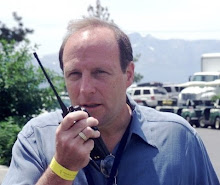We are constantly amazed at my peculiar ability to somehow end up in situations that seemingly never happen to anyone else.
I mean, who else could wait seven long years for the opportunity to coach his first youth sports team and then find himself without a son or daughter on the squad.
Only me.
Now, when the inevitable bumps and bruises occur on the field of play, I’m a typical male. With my 13 year-old son, Mike, I play the Mr. Macho Tough Guy role, operating on the basic philosophy that if you’re not bleeding, you’re fine. (Actually, that’s just what I say to get a rise out of my wife, Kathi, and a laugh out of fellow Tough Guy Macho Male dads). “Be tough, shake it off and get back into the game,” is my mantra with Mike.
I was not nearly so harsh years earlier with my daughter, Meaghan, and the girls on our Under 8 soccer team.
After waiting almost a decade, Meaghan turned seven and I finally had my shot at coaching my first youth sports team. (You might not think seven years is almost a decade, but don’t forget the nine months that I had to wait for her to be born). We had just moved to Pennsylvania from Connecticut and Meggie was a spry, little second-grader who was as active as the next kid though not necessarily athletically inclined.
The luck of the draw had me with a roster that included Meggie and a bunch of her friends from school, three of whom ended up as high school soccer stars.
So, we had a clear edge in speed and athleticism in every game (won the league title at 7-1 -- our loss was my fault; poor substitution pattern that had girls not well-suited for defense in those positions at the end of the game).
After the first couple of practices – forgive the predictable cliché, but girls that age are unspeakably cute -- Kathi and I were informed by our doctor that Meaghan’s consistent string of strep throats required a blood workup. The result was a definitive diagnosis of Mononucleosis.
Of course, Mr. Macho Tough Guy has always believed that -- at least to some extent -- these invisible, so-called ailments, like Mononucleosis have more to do with lack of discipline and will rather than any real physical malady.
“Epstein-Barr Syndrome?,” I would say to myself skeptically. “I’ve got an idea. Get a good night’s sleep and then man-up.”
“Attention Deficit Disorder? Please,” I would mutter to myself. “I know a treatment. Discipline and consequences. Try that.”
In my admittedly neanderthal world, Mononucleosis fell into the same general category, except that this one was close to home.
So, the practical, pragmatic guy that I am, I accepted the diagnosis and then was told that Meaghan would miss most – if not all – of the season. Limited general activity and no sports were the doctor's orders. She had an enlarged spleen and physical contact could result in the kind of injury that I would be able to see – like my daughter doubled over in pain with internal bleeding. As with most of these things, Kathi was in charge of Meaghan’s availability and since I had plenty of bodies and plenty of talent, I never even brought it up.
So, fully committed to the team and excited about our athleticism, I marshaled on without a child on the active roster. It was easy because I was inspired by these girls (who I called guys – I asked permission; they said OK) who tried to do everything I said. And by Meggie, who came to most of the games and rooted for her friends from the sideline.
Toward the end of the season (as with most youth sports teams), the girls actually started to get it, combining spacing on the field with their speed and strength. Also, some became good dribblers, enabling me to take partial (ok, miniscule) twinkle-in-the-eye credit for their success in high school. Thus, when Kathi gave the green light for Meggie to come back for the last game of the year, I was pumped to get her out there even though she was way behind all the other kids on the team.
So, she didn’t start that final game (and could not have cared less). A few minutes of playing time would be just fine with Meaghan.
The magic, Kathi told me, was that she was finally wearing the same uniform as her friends and that we were all going out for ice cream after the game.
Still, I was excited to finally, actually realize the objective that had motivated me to take on the coaching commitment in the first place. I wanted to be directly involved in my daughter experiencing the fun of organized youth sports activity.
A short while later, I subbed her for one of our midfielders and about two minutes into my utopian moment, a kicked ball nailed her right in the stomach. She stopped in her tracks but was uninjured. Still, Kathi told me to take her out of the game.
But, wait. As the coach, I was in charge, not Kathi, right? Once I saw she was okay, shouldn’t she have shaken it off and stayed in the game? Especially since she had missed the entire season?
Nah. I pulled her out and she never got any more playing time.
And that was just fine with me, too.
###
Bookmark it - New content weekly.
Comment? Please post.
Similar story? Please post.
Review nhà cái uy tín: 12bet
1 year ago



